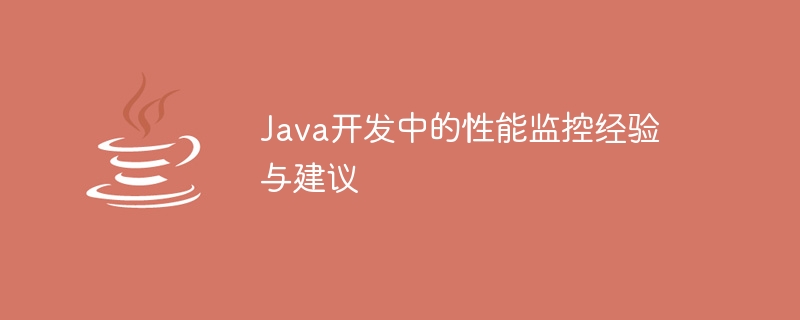Home >Java >javaTutorial >Performance monitoring experience and suggestions in Java development
Performance monitoring experience and suggestions in Java development
- PHPzOriginal
- 2023-11-22 14:55:59791browse

As a programming language used to develop enterprise-level applications, Java has a wide range of applications. However, as applications grow in size and complexity, performance monitoring becomes increasingly important. This article will share some performance monitoring experience and suggestions in Java development to help developers better manage and optimize the performance of their applications.
First of all, for performance monitoring in Java development, we need to focus on the following aspects: monitoring the overall performance of the application, paying attention to key indicators, analyzing performance data, and taking corresponding optimization measures.
1. Monitor the overall performance of the application
Monitoring the overall performance of the application is the basis of performance monitoring, because only by understanding the overall performance can targeted analysis and optimization be carried out. In Java development, we can use various monitoring tools to monitor the overall performance of the application, such as JConsole, VisualVM, and commercial APM tools. These tools can help us monitor key performance indicators such as memory usage, thread status, and CPU utilization of applications in real time, and can also perform stack analysis, thread analysis, etc.
2. Pay attention to key indicators
In the performance monitoring process, we need to focus on some key performance indicators, such as response time, throughput, error rate, etc. These indicators can help us understand the performance status of the application and detect performance problems in time. In Java development, you can use logging frameworks, monitoring tools, or custom indicators to collect and monitor these key indicators.
3. Analyze performance data
After collecting performance data, we need to analyze it to find performance bottlenecks and optimization points. In Java development, you can use the analysis functions provided by performance monitoring tools, such as stack analysis, code hotspot analysis, etc., to gain an in-depth understanding of the performance status of the application. In addition, you can also use data visualization tools to visualize performance data to understand performance more intuitively.
4. Take corresponding optimization measures
After analyzing the performance data, we need to take corresponding optimization measures in a timely manner to improve the performance of the application. In Java development, optimization can be carried out from various aspects such as code, architecture, database, cache, etc., such as optimizing SQL queries, reducing memory overhead, optimizing algorithms, using cache, etc. In addition, you can also consider using some performance optimization tools, such as JProfiler, YourKit, etc., to help locate performance problems and optimize code.
To sum up, performance monitoring in Java development is a complex and important task. It requires comprehensive consideration of the overall performance of the application, paying attention to key indicators, analyzing performance data, and taking optimization measures in a timely manner. Through continuous performance monitoring and optimization, it can help developers better manage and optimize the performance of their applications, improve user experience, and better meet business needs. I hope that the experience and suggestions shared in this article can provide some reference and help to Java developers in performance monitoring.
The above is the detailed content of Performance monitoring experience and suggestions in Java development. For more information, please follow other related articles on the PHP Chinese website!

